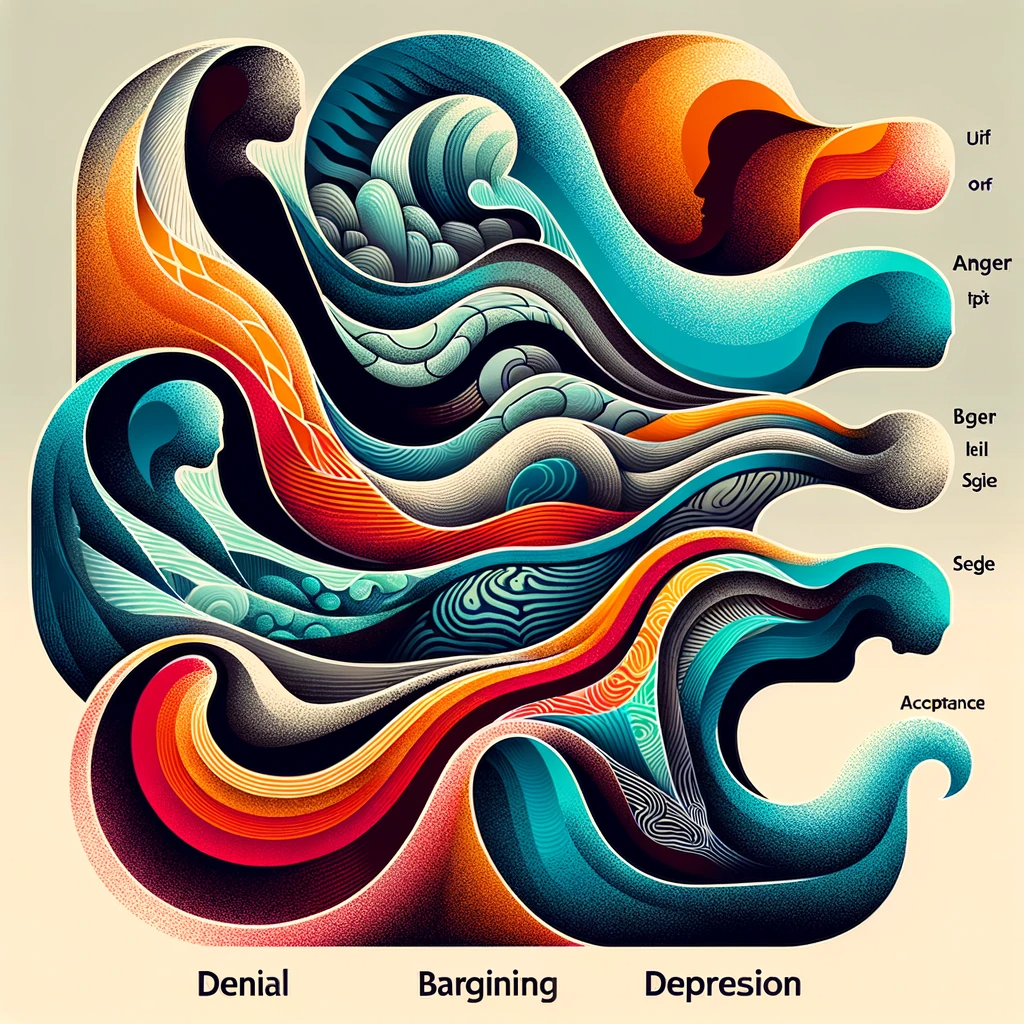Grieving the Loss of a Sibling: Navigating Through the Heartache
Explore the unique journey of grieving a sibling's loss. Understand the stages of grief, the emotional and physical impact, and the importance of creating an enduring connection. Find solace in recognizing personal grief paths and learn healthy coping strategies for this profound experience

When those you love die, the best you can do is honor their spirit for as long as you live. You make a commitment that you’re going to take whatever lesson that person or animal was trying to teach you, and you make it true in your own life… It’s a positive way to keep their spirit alive in the world, by keeping it alive in yourself.
Patrick Swayze, American actor
Introduction
The loss of a sibling is a profound and life-altering event. It brings a cascade of emotions that can be overwhelming and complex. Grieving such a significant loss is not a linear process; it involves various stages and a range of emotions. This article aims to explore the grieving process, highlighting the importance of grief counseling, support groups, and healthy grieving practices. Understanding and accepting the unique nature of this journey is crucial for those who are experiencing the intense pain of losing a sibling.
Understanding Grief: A Comprehensive Overview
Grief is a profound and multifaceted response to loss, particularly to the loss of someone or something to which a bond was formed. It's a deep emotional pain that arises when we are confronted with a significant absence in our lives. This natural response can manifest in a myriad of ways, both emotionally and physically, and varies greatly from person to person.

Emotional Symptoms of Grief
The mental health emotional landscape of grief is complex and can encompass a wide range of feelings. Some of the common emotional symptoms include:
- Intense Sadness: Perhaps the most recognizable sign of grief, this deep sorrow is often at the heart of the grieving process.
- Anger: Many people feel anger or frustration, either directed at the situation, themselves, or even the person who has passed away.
- Guilt: Feelings of guilt or regret over things said or not said, done or not done, are common.
- Anxiety and Fear: Grief can trigger feelings of anxiety, fear, or insecurity about the future.
- Numbness: Some people experience emotional numbness or detachment as a way of coping with the initial shock.
Physical Symptoms of Grief
Grief isn't just an emotional process; it can also have physical manifestations, such as:
- Changes in Appetite: Some may lose their appetite, while others might turn to food for comfort.
- Sleep Disturbances: This includes trouble falling asleep, staying asleep, or experiencing restless sleep.
- Physical Pain: Symptoms like headaches, body aches, or stomach pains are not uncommon.
- Fatigue: The emotional toll of grief can lead to exhaustion and a lack of energy.
The Grieving Process
Grief is a deeply personal experience, and there is no uniform way to navigate it. The grief process itself is influenced by a variety of factors, including one's relationship with the deceased, cultural background, life experiences, and existing support systems. Understanding the following aspects can be helpful:
- Stages of Grief: While not everyone will experience them in order or at all, stages like denial, anger, bargaining, depression, and acceptance provide a framework for understanding grief.
- Individual Differences: Each person grieves in their own way. What works for one person may not work for another, and this diversity in the grieving process should be respected.
- Time Frame: There is no set timeline for grieving. For some, the intense feelings may subside with time, while for others, grief might be a longer journey.
- Seeking Professional Help: For those struggling to manage their grief, seeking help from a grief counselor or therapist can provide support and strategies to cope.
Healthy Grieving
Engaging in healthy grieving practices is crucial. This includes acknowledging and expressing feelings, seeking support from loved ones or support groups, and taking care of one's physical health. It's important to remember that experiencing grief is not a sign of weakness but a natural part of dealing with a significant loss.
No Right or Wrong Way
It's vital to recognize that there is no "correct" way to grieve. Each person's journey through grief is unique, and what matters most is finding a path that allows for healing and adjustment to life after loss. Accepting and respecting this personal journey is key to the healing process.

Stages of Grief
The concept of the stages of grief, first introduced by Elisabeth Kübler-Ross in her 1969 book "On Death and Dying," has been a fundamental model in understanding how people confront and process loss. These stages are denial, anger, bargaining, depression, and acceptance. However, it's crucial to recognize that the grieving process is highly personal, and these stages are not a rigid roadmap but rather a framework to help us comprehend the complex nature of early stages of grief.
Denial
- Initial Shock and Disbelief: In this stage, individuals often find it hard to accept the reality of their loss. Denial serves as a defense mechanism to buffer the immediate shock, allowing one to process their loss at their own pace.
- Natural Response: Denial can be seen as a natural response to overwhelming emotions, providing temporary respite from the pain of loss.
Anger
- Emotional Release: As the masking effects of denial begin to fade, pain re-emerges, and with it, often comes anger. This anger might be directed at inanimate objects, complete strangers, friends, family, or even the deceased.
- Seeking Blame: Anger may involve seeking someone or something to blame for the injustice of the loss, serving as a connection to the reality of the situation.
Bargaining
- Seeking Control: This stage involves the hope that one can somehow undo or avoid the cause of the grief. It often involves “if only” statements, reflecting on what could have been done differently to prevent the loss or mitigate its impact.
- Guilt and Negotiation: Bargaining may also be accompanied by feelings of guilt, where the grieving person may dwell on things they wish they had or hadn't done with their lost loved one.
Depression
- Immense Sadness: As the reality of the loss sets in, it's common for intense sadness and depression to emerge. This stage is marked by feelings of emptiness, despair, and deep sorrow.
- Withdrawal and Reflection: Individuals may withdraw from life, feel overwhelmed, and experience a sense of loneliness as they process the grief in a more introspective way.
Acceptance
- Coming to Terms: Acceptance does not mean one is okay with the loss. Rather, it means acknowledging the reality of the situation and recognizing that this new reality is the permanent reality.
- Adjusting to Life: In this stage, individuals begin to adjust to life without their loved one, exploring ways to forge ahead and gradually finding ways to enjoy life again.
Understanding the Fluidity of Grief
It's vital to understand that these stages are not linear and do not prescribe a specific way to grieve. People may experience these stages in different orders, revisit them multiple times, or even skip some stages entirely. Grief is a highly individual and personal process, and everyone experiences it differently.
Embracing the Unpredictability
The unpredictability of grief, with its ebb and flow of emotions and stages, means that individuals may find themselves, for instance, moving from anger to grief shock depression and then back to denial. Recognizing this fluidity can help in managing expectations around the grieving process and understanding that such fluctuations are a normal part of healing.
While the stages of grief provide a helpful framework, it's important to remember that grieving is a personal journey that is as unique as the individual experiencing it. There is no right or wrong way to grieve, and allowing oneself to experience these stages in one's own way and time is crucial for healing and finding a path forward after a significant loss.
The Unique Grief of Losing a Sibling
The loss of a sibling is a profound experience that can deeply impact an individual's emotional world. Siblings often share a lifelong bond that is distinct from other familial relationships, making the grief experienced in their loss unique in its intensity and complexity.
Intense Grief and Shock
- Initial Shock: The suddenness of losing a sibling can bring about a state of disbelief and shock. This initial response can be a numbing experience, where the reality of the loss feels surreal.
- Depth of Grief: The depth of grief experienced can be overwhelming. For many, a sibling is not just a family member, but a confidant, a friend, and a significant part of their formative years.
Loneliness and Disconnection
- Loss of a Unique Relationship: Siblings share a unique relationship, often characterized by shared experiences and memories. The loss of this relationship can leave one feeling profoundly lonely and disconnected.
- Changed Family Dynamics: The death of a sibling can also alter family dynamics significantly. The grieving individual might feel a sense of disconnection, not just from the deceased but from other family members as well, as everyone in the family grieves differently.
Emotional Complexity
- Mixed Emotions: Grieving the loss of a sibling can involve a complex mix of emotions beyond sadness, including guilt, anger, or even relief, especially in cases where there was a fraught or complicated relationship.
- Rekindling Past Memories and Emotions: The loss often brings up past memories, both positive and negative. This can include unresolved issues, leading to complicated grief where the bereaved grapples with a mix of conflicting emotions about the past.
Unique Bond and Shared History
- Shared Childhood and Experiences: Siblings often grow up together, sharing many first experiences and milestones. This shared history creates a bond that is irreplaceable.
- Understanding and Relatability: A sibling often understands one's background, upbringing, and family dynamics in a way that few others can, making their loss deeply felt.
Elaborating on Creating an Enduring Connection
Maintaining an enduring connection with a deceased sibling is a significant aspect of the grieving process for many people. This practice can help in honoring the memory of the lost sibling and provide a sense of continuity in the face of loss. There are various ways to create and sustain this connection, each providing a unique pathway to remember and celebrate the life of the sibling.
Creating Memorials
- Physical Memorials: Setting up a physical memorial, such as planting a tree, creating a garden, or dedicating a bench in their favorite spot, can provide a tangible reminder of the sibling.
- Online Tributes: In the digital age, creating an online memorial through social media or dedicated websites can be a way to share memories and allow others to contribute their recollections and condolences.
Participating in Activities
- Shared Interests: Engaging in activities or hobbies that the sibling enjoyed can be a way to feel closer to them. It can be as simple as listening to their favorite music, watching their favorite movies, or visiting places they loved.
- Special Events: Marking special dates, such as their birthday or the anniversary of their passing, with a specific activity or ritual can become a meaningful tradition.
Dedicating Time to Causes
- Charitable Work: Getting involved in charities or causes that were important to the sibling can be a way to carry on their legacy and passions. This can include fundraising, volunteering, or even starting a charity in their name.
- Advocacy and Awareness: If the sibling’s death was due to a particular condition or circumstance, becoming involved in related advocacy or awareness campaigns can be a powerful way to honor their memory and potentially help others.
Personal Reflections and Expressions
- Journaling and Writing: Writing letters to the deceased sibling, keeping a journal of memories, or composing poems and stories about them can be therapeutic.
- Artistic Expression: Creating art, music, or crafts in memory of the sibling can be a deeply personal way to express and process feelings of grief and love.
Preserving Memories
- Photo Albums and Memory Boxes: Creating a collection of photos, videos, and mementos that reflect the life and times shared with the sibling can be a comforting way to revisit memories.
- Sharing Stories: Regularly sharing stories and anecdotes about the sibling with friends and family helps keep their memory alive in communal consciousness.
Creating an enduring connection with a deceased sibling is a deeply personal endeavor, and there is no right or wrong way to do it. These connections can provide comfort, a sense of continuity, and a meaningful way to honor and remember a loved sibling. This process can also play a crucial role in the healing journey, allowing for a healthy expression of grief and a celebration of the sibling’s life and impact.
What is Anticipatory Grief?
In cases where a sibling is terminally ill, anticipatory grief may occur. This form of grief happens before the actual loss and involves grieving the impending death of a loved one. It can be just as painful memories intense as the grief experienced after a death and may include many of the same emotional and physical symptoms.
Seeking Professional Help
Grief Counseling and Therapy
For those struggling with the intensity of their grief, seeking professional help can be beneficial. Grief counselors and therapists specialize in helping individuals navigate their grief journey. They can provide valuable tools and strategies for managing grief and can support the bereaved in processing their emotions in a healthy way.
Support Groups
Joining a support group can be an invaluable resource for those grieving the loss of a sibling. Sharing experiences with others who have gone through a similar loss can provide comfort and understanding. These groups offer a safe space to express feelings and receive support from peers.
Healthy Grieving Practices
Self-Care and Establishing Healthy Habits
Engaging in self-care and establishing healthy habits are crucial aspects of healthy grieving. This includes maintaining a balanced diet, regular exercise, and sufficient sleep. Taking time for activities that bring joy and relaxation can also be therapeutic.

Dealing with Intense Emotions
Experiencing intense emotions is a normal part and natural process of grieving. It's important to allow oneself to feel these emotions, whether it's sadness, anger, or guilt. Writing in a journal, talking with trusted friends or family members, or expressing feelings through art or music can be helpful ways to process these emotions.
Grieving the loss of a sibling is a deeply personal and unique experience. There is no timeline for grief, and it's important to allow oneself the time and space to grieve in one's own way. Seeking support from grief counselors, therapy, and support groups can provide much-needed guidance and comfort. Embracing healthy grieving practices and finding ways to maintain a connection with the deceased sibling can aid in the healing process. Remember, it's completely normal to feel a range of emotions, and each person grieves differently. The journey through grief is not about moving on from the loss but learning to live with it, integrating the experience into daily life, and finding a way forward
The Role of the Grief Recovery Room at Caregiver Relief
Overview and Benefits
The Grief Recovery Room at Caregiver Relief is a dedicated space designed to support individuals in their grief journey. It provides a structured, supportive environment where individuals can explore their feelings, receive guidance, and connect with others who are experiencing similar losses. Key benefits include:
- Professional Support: Access to grief counselors and therapists who specialize in bereavement care.
- Peer Support: Interaction with others who have experienced the loss of a sibling, offering empathy and shared understanding.
- Structured Programs: Tailored programs that address various aspects of grief, from understanding the process to managing intense emotions.
- Holistic Approach: Focus on both emotional and physical aspects of grief, promoting overall well-being.
Advantages in Grieving Process
Engaging with grief work the Grief Recovery Room can positively impact the grieving process by:
- Providing a safe space to express and validate emotions.
- Offering coping strategies to manage the day-to-day impact of grief.
- Helping to mitigate feelings of isolation by connecting with others.
- Guiding towards a path of healing, encompassing both emotional and physical health.

Seeking Professional Help
Grief Counseling and Therapy
For those experiencing complicated or intense grief, professional help, grief therapy can be invaluable. Grief counselors and therapists provide personalized support, helping individuals navigate their unique grief journey.
Support Groups
Support groups, like those offered at the Grief Recovery Room, provide a community of understanding and support, crucial for those grieving a significant loss.
Ready to start sharing …
Share your sorrow. Write to start to heal
“You know, life fractures all of us into little pieces. It harms us, but it’s how we glue those fractures back together that makes us stronger.”
― Carrie Jones, Entice
You might also like this article:









